Pope Wraps Up Canadian Apology Tour with Northern Stop

Pope Francis attends the Liturgy of the Word during the Lac Ste. Anne Pilgrimage, an annual pilgrimage that welcomes tens of thousands of Indigenous participants from throughout Canada and the United States each year, at Lac Ste. Anne, Alberta, Canada July 26, 2022. Photo: Guglielmo Mangiapane/Reuters
Pope Francis makes a brief visit to the Arctic territory of Nunavut on Friday, the last stop in his six-day visit to Canada to apologize to indigenous people for abuse in government schools run by the Roman Catholic church.
Francis will meet with indigenous representatives from eastern Canada in Quebec City on Friday morning before flying to Iqaluit, Nunavut’s capital.
The city of 7,700 sits among rocky hills overlooking Frobisher Bay, covered in ground-hugging purple flowers and the rare tree. Iqaluit, reachable only by plane or ship, is located too far north for trees to consistently grow.
It is the farthest north a pope has travelled since Pope John Paul II visited Tromso, Norway, in 1989.
In Nunavut, an Arctic territory Canada created in 1999 for the Inuit people, the Pope will meet privately with residential school survivors in an elementary school during a 2-1/2-hour stop.
Tanya Tungilik, whose late father Marius Tungilik has said he was abused by Roman Catholic priests, hopes to ask Francis to help bring to justice clergy members who abused children, along with those who hid their crimes.
“I want to tell him the full effects of what his church has done to my father and to my family,” Tungilik said.
More than 150,000 indigenous children were separated from their families and brought to residential schools, which operated between 1870 and 1996.
Catholic religious orders ran most of the schools under successive Canadian governments’ policy of assimilation.
The children were beaten for speaking their native languages and many sexually abused in a system Canada’s Truth and Reconciliation Commission called “cultural genocide.”
After meeting with school survivors, Francis will watch a public program featuring Inuit traditions such as throat singing and drum dancing, and deliver his last formal remarks on the trip.
Francis is scheduled to leave Canada for Rome at 6:15 p.m. Eastern time (22:15 GMT).
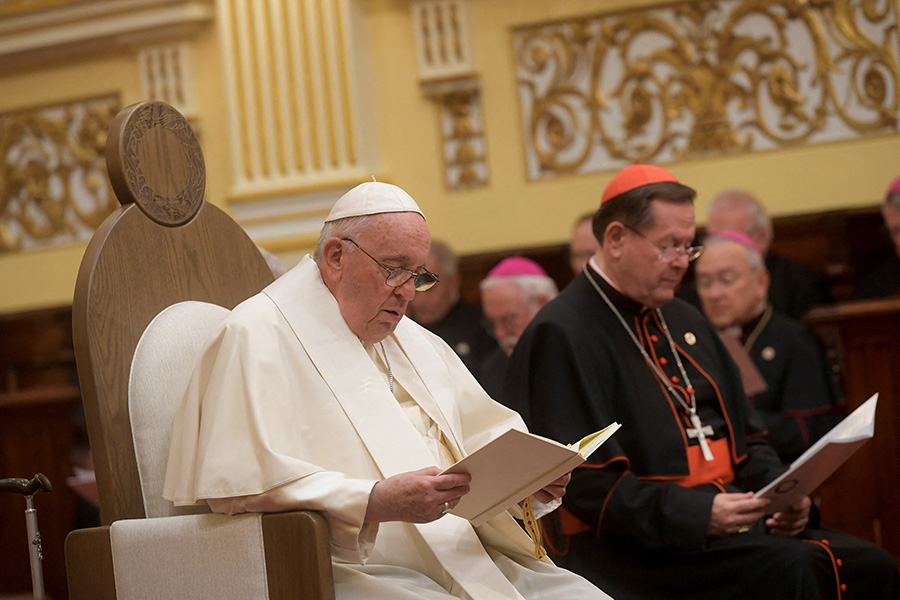
The pope on Monday traveled to the Alberta town of Maskwacis, the site of two former schools, and issued a historic apology that called the Church’s role in the schools, and the forced cultural assimilation they attempted, a “deplorable evil” and “disastrous error.”
His pleas for forgiveness evoked strong emotions for many but fell short of what some survivors and indigenous leaders hoped for. Since then, however, the pope has built on the apology, referring to both institutional failures and sexual abuse in subsequent speeches — addressing some of the grievances raised by survivors.
Tungilik and others specifically want the Pope to pressure France to extradite retired priest Johannes Rivoire, who faces a Canadian charge of sexually assaulting a young girl in the 1970s, and allegedly others, including Marius Tungilik.
Canada’s Justice Department confirmed this week that it has asked France to extradite Rivoire. Prime Minister Justin Trudeau’s office has said that he discussed the Rivoire case with the pope during his private meeting on Wednesday.
In Iqaluit, the environment-minded Francis will visit a region that is a focal point of climate change, with sea ice retreating and altering fishing and hunting practies, and permafrost thawing.
(Additional reporting by Philip Pullella and Steve Scherer, editing by Deepa Babington)
July 28, 2022
Canadian Leaders Tell Pope Francis of Horrors of Indigenous Schools
Canada’s leaders on Wednesday pointedly told Pope Francis of the horrors of Church-run residential schools for indigenous and the pontiff lamented that many were still living in poverty in one of the world’s richest countries.
Francis flew east across the country from Edmonton in the prairies of Alberta to Quebec on the St. Lawrence River for meetings with the country’s leadership in one of the oldest cities in the Americas.
Francis is on an apology tour of Canada, seeking forgiveness for the Catholic Church’s role in residential schools that carried out government policies aimed at assimilating natives by trying to erase their cultures.
More than 150,000 indigenous children were separated from their families and brought to residential schools, which operated between 1870 and 1996. They were starved or beaten for speaking their native languages and sexually abused in a system that Canada’s Truth and Reconciliation Commission called “cultural genocide”.
Addressing government officials, including Prime Minister Justin Trudeau at the Citadelle de Quebec, the largest British fortress built in North America, Francis spoke of “the radical injustice” of the unequal distribution of wealth.
“It is scandalous that the wellbeing generated by economic development does not benefit all the sectors of society,” he said, noting that many needy people or homeless had to turn to churches and food banks to survive.
“And it is indeed sad that precisely among the native peoples we often find many indices of poverty, along with other negative indicators, such as the low percentage of schooling, and less than easy access to owning a home and to health care,” he said.
Indigenous people, who make up about 5 percent of Canada’s population, have higher levels of poverty and a lower life expectancy than other Canadians, and are more often victims of violent crime, and more likely to suffer from addiction and be incarcerated.
In their addresses to the pope, both Trudeau and Governor General Mary Simon, who represents Queen Elizabeth II, poignantly and pointedly told him of the tragedies that unfolded in the schools, the last of which closed nearly two decades before Francis became pope.
Alone, Isolated and Abused
“As a dad, I can’t imagine having my children being taken away. When my kids are crying, I can console them. When they’re happy, I can share that feeling of joy with them,” Trudeau said.
“But in residential schools, these children were alone and isolated in their pain and sorrow, far from their families and communities. And even worse, stripped of their language, their culture, their identity,” the prime minister said.
At the Citadelle, Trudeau, who has made reconciliation with Canada’s indigenous peoples one of his political priorities, and Simon greeted the pope along with an honor guard wearing red uniforms and black bearskin caps.
“With this visit you’re signaling to the world that you and the Roman Catholic Church are joining us on our path of reconciliation, healing, hope and renewal,” Simon said.
“But these people, these survivors, they defy definition. They are parents who defended their children when no one else would. They are advocates who fought, and are still fighting, for their languages and cultures so that they can thrive for generations to come,” she said.
The pope said the Church was “admitting our faults” and wanted to join civil authorities “to promote the legitimate rights of the native populations and to favor processes of healing and reconciliation” between indigenous and non-indigenous Canadians.
On Monday, the pope traveled to the town of Maskwacis, the site of two former schools, and issued a historic apology that called the Church’s role in the schools, and the forced cultural assimilation they attempted, a “deplorable evil” and “disastrous error”.
On Tuesday, he said the Roman Catholic Church should accept institutional blame for the harm done to indigenous Canadians.
On Thursday, Francis will visit the Sanctuary of Sainte-Anne-de-Beaupre, the oldest Catholic pilgrimage site in North America, and meet the archbishop of Quebec, Canada’s largely French-speaking province, in the Notre-Dame de Quebec Cathedral.
On his way back to Rome on Friday, he will stop for a few hours in Iqaluit in the Canadian Arctic, where the pope is expected to discuss the threat that climate change poses to indigenous communities.
(Refiles to remove reference to governor general from advisory)
(Additional reporting by Steve Scherer and Anna Mehler Paperny; Editing by Deepa Babington and Aurora Ellis)
July 27, 2022
The Pope Travels to Quebec for Meetings With PM Justin Trudeau and Governor General Mary Simon
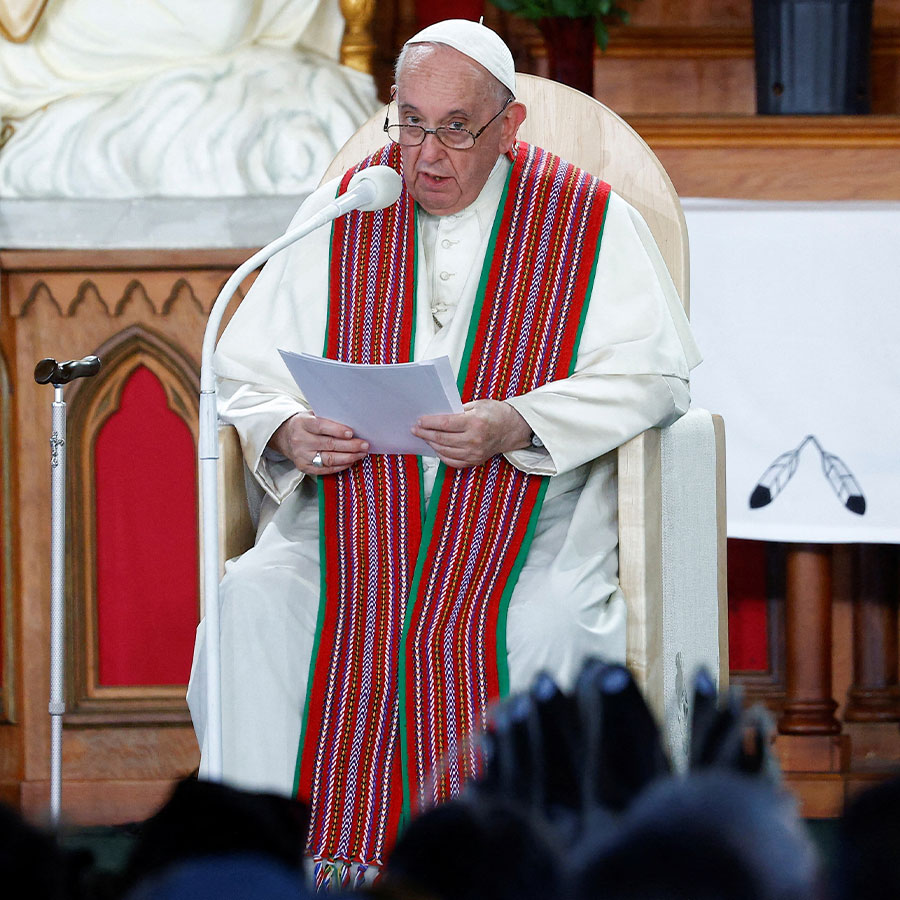
Pope Francis travels on Wednesday to Quebec for meetings with Canada’s political leadership, a mostly political pause from the main purpose of his trip – apologizing for the Church’s role in running indigenous schools.
Francis leaves Edmonton, Alberta, for Quebec’s capital city and goes directly from the airport to the Citadelle de Quebec, the largest British fortress built in North America.
The Citadelle, which sits on the banks of the St Lawrence River, is a historic site and one of the official residences of Canada’s Governor General, Mary Simon, who is the representative of Queen Elizabeth, the head of state.
There Francis will meet Simon, who is the first Indigenous person to serve as governor general. He then holds an official meeting with Prime Minister Justin Trudeau, who has made reconciliation with Canada’s indigenous peoples one of his political priorities.
Francis will speak to about 100 officials, diplomats and indigenous leaders after the official meetings.
On Tuesday, the pope presided over an open-air Mass in a football stadium while seated because of a knee ailment. Later, he visited Lac Ste. Anne, a pilgrimage site popular with both indigenous Canadian Catholics and those of European origin.
There, he said the Roman Catholic Church should accept institutional blame for the harm done to indigenous Canadians in residential schools that tried to wipe out native cultures.
During his first full day in Canada on Monday, the pope traveled to the town of Maskwacis, site of two former schools, and issued a historic apology that called the Church’s role in the schools, and the forced cultural assimilation they attempted, a “deplorable evil” and “disastrous error”.
More than 150,000 indigenous children were separated from their families and brought to residential schools over the years. Many were starved or beaten for speaking their native languages and sexually abused in a system that Canada’s Truth and Reconciliation Commission called “cultural genocide”.
On Thursday, Francis will visit the Sanctuary of Sainte-Anne-de-Beaupre, the oldest Catholic pilgrimage site in North America, and meet the Archbishop of Quebec, Canada’s largely French-speaking province, in the Notre-Dame de Quebec Cathedral.
On his way back to Rome on Friday, he will stop for a few hours in Iqaluit in the Canadian Arctic, where indigenous issues will return to the fore.
(Writing by Steve Scherer, additional reporting by Anna Mehler Paperny; Editing by Robert Birsel)
July 26, 2022
At Mass in Edmonton, Pope Francis Praises Indigenous Reverence for Elders

Update: Pope Francis on Tuesday praised the indigenous tradition of showing great respect for elders and learning from them, saying their memory must not be lost in modern society’s “fog of forgetfulness.”
Francis is on a week-long tour of Canada to apologize for the Roman Catholic Church’s role in running residential schools that tore indigenous children away from their families and became places where abuse was rampant.
His words were particularly poignant for indigenous communities because the residential schools, which ran from 1870 to 1996, destroyed the link between generations so precious to indigenous cultures.
He presided over the Mass while seated because of a knee ailment and in his homily hoped for “a future in which the history of violence and marginalization suffered by our indigenous brothers and sisters is never repeated.”
The Mass at Edmonton’s Commonwealth Stadium was held a day after the pope travelled to the town of Maskwacis, site of two former schools, and issued a historic apology that called the Church’s role in schools and the forced cultural assimilation they attempted a “deplorable evil” and “disastrous error”.
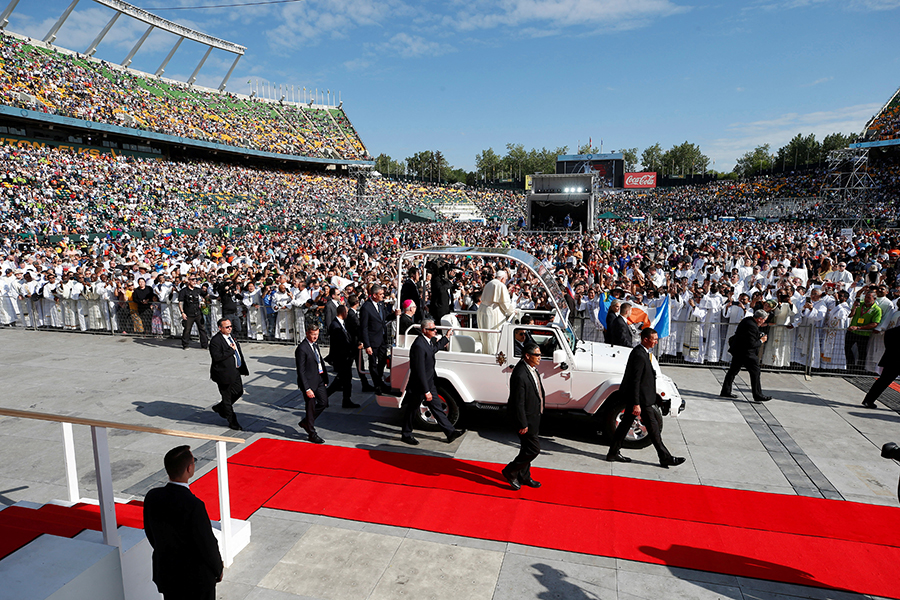
About 50,000 people attended the service, which took place on the day the Roman Catholic Church marks the feast of the grandparents of Jesus. Francis, who has often spoken about what he learned from his grandmother Rosa in Buenos Aires, used the occasion to repeat his frequent appeals to younger generations to cherish their grandparents and learn from them.
Francis called grandparents “a precious treasure that preserves a history greater than themselves”. He said modern society should be more attuned to the gifts of elders, who should not be pushed aside simply because they could not be as productive as before.
“In the fog of forgetfulness that overshadows our turbulent times, it is essential to cultivate our roots, to pray for and with our forebears, to dedicate time to remember and guard their legacy. This is how a family tree grows; this is how the future is built.”
Never Forget, But Forgive
Francis entered the stadium standing in a popemobile, which stopped frequently as it toured the pitch so babies and children could be brought to him to kiss or bless.
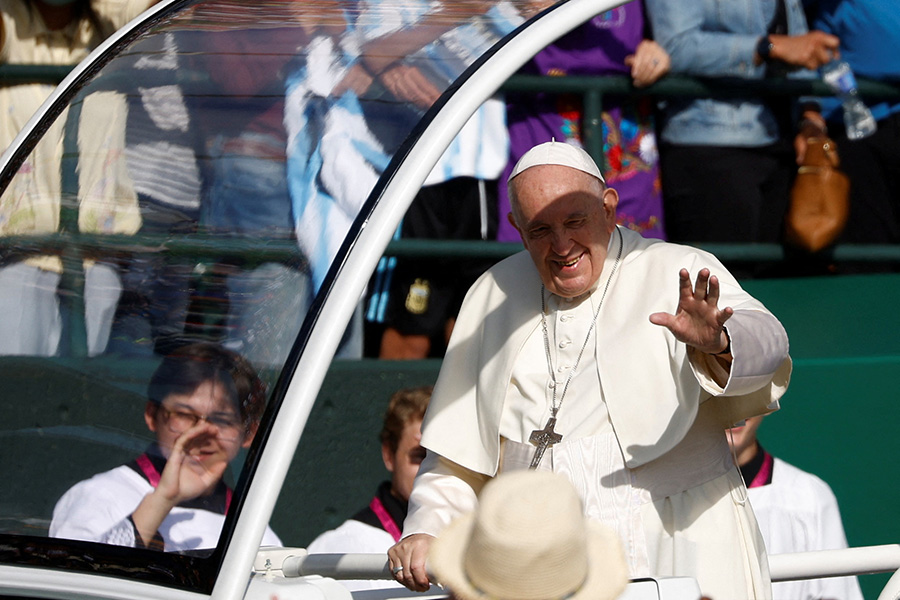
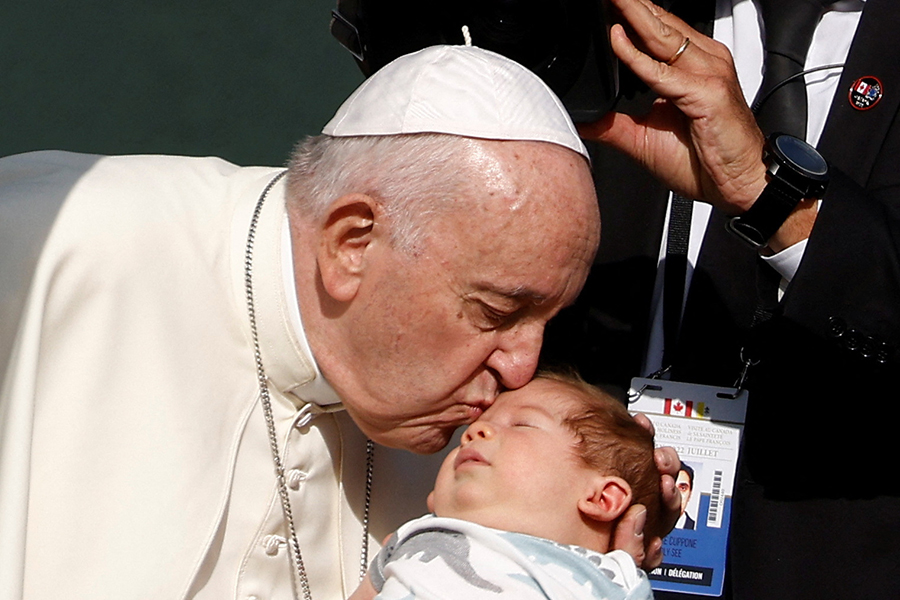
Before the pope arrived, Phil Fontaine, a former Assembly of First Nations National Chief and a residential school survivor, reflected on Francis’s visit on Monday to Maskwacis.
“I want to say to you my friends that what we really are talking about is forgiveness. We will never reach reconciliation without forgiveness,” Fontaine said.
“We will never forget but we must forgive. We invite the Catholic Church to rebuild the fractured relationship it had with us, for us and for all Canadians.”
Fontaine was among the indigenous leaders who met the pope at the Vatican earlier this year and invited him to Canada.
In the afternoon, Francis is due to visit Lac Ste. Anne, a pilgrimage site about 70 km (44 miles) west of Edmonton popular with both indigenous Canadian Catholics and those of European origin.
More than 150,000 indigenous children were separated from their families and brought to residential schools over the years. Many were starved, beaten for speaking their native languages and sexually abused in a system that Canada’s Truth and Reconciliation Commission called “cultural genocide.”
Indigenous leaders as well as survivors of the schools said that while the pope’s apology on Monday evoked strong emotions and was a highly significant step towards reconciliation, more action needed to be taken by the Church and the government.
“You can’t just say, ‘I am sorry,’ and walk away. There has to be effort, and there has to be work in more meaningful actions behind words,” said Nakota Sioux Nation Chief Tony Alexis.
On Wednesday, the pope will travel to Quebec City for the more institutional part of his visit, meeting with government officials and diplomats.
On his way back to Rome on Friday, he will stop for a few hours in Iqaluit in the Canadian Arctic, where indigenous affairs will return to the fore.
The Iqaluit area is one of the fastest-warming parts of North America and there the pope is expected to address the dangers of climate change.
(Additional reporting by Steve Scherer; Editing by Christian Schmollinger and Deepa Babington)
Earlier today:
Continuing His Apology Tour, Pope Francis Prepares for Stadium Mass

Pope Francis will say Mass for an expected crowd of 60,000 people on Tuesday, his first big open-air event on a trip to Canada centred around apologizing for the Catholic Church’s role in residential schools that tried to erase native cultures.
The Mass takes place on the day the Roman Catholic Church marks the feast of the grandparents of Jesus.
Francis is expected to repeat his frequent appeals to younger generations to cherish their elders and learn from them, a custom still revered in indigenous communities but waning in many Western societies.
In the afternoon, Francis, who is using a wheelchair and a cane because of a knee ailment, is due to visit Lac Ste. Anne, a pilgrimage site about 70 km (44 miles) west of Edmonton popular with both Indigenous Canadian Catholics and those of European origin.
The highlight of Monday, Francis’ first full day in Canada, was his visit to the city of Maskwacis, formerly home to two residential schools. There he issued an historic apology, calling the Church’s role in schools and the forced cultural assimilation they attempted a “deplorable evil” and “disastrous error.”
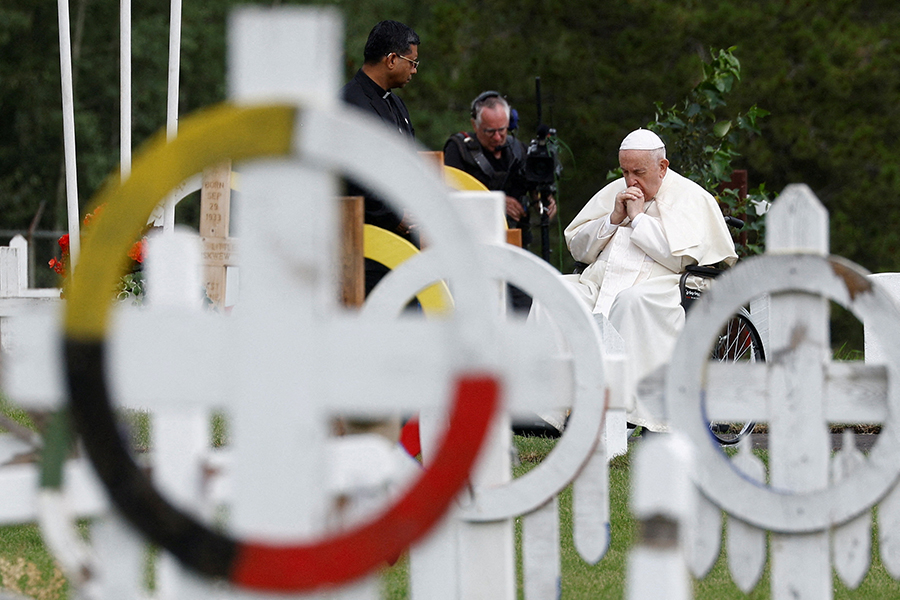
More than 150,000 indigenous children were separated from their families and brought to residential schools. Many were starved, beaten for speaking their native languages and sexually abused in a system that Canada’s Truth and Reconciliation Commission called “cultural genocide.”
Indigenous leaders as well as survivors of the schools said that while the pope’s apology evoked strong emotions and was a highly significant step towards reconciliation, more action needed to be taken by the Church and the government.
“You can’t just say, ‘I am sorry,’ and walk away. There has to be effort, and there has to be work in more meaningful actions behind words,” said Nakota Sioux Nation Chief Tony Alexis.
On Wednesday, the pope will travel to Quebec City for the more institutional part of his visit, meeting with government officials and diplomats.
On his way back to Rome on Friday, he will stop for a few hours in Iqaluit in the Canadian Arctic, where indigenous affairs will return to the fore.
The Iqaluit area is one of the fastest-warming parts of North America and there the pope is expected to address the dangers of climate change.
(Additional reporting by Steve Scherer; Editing by Christian Schmollinger)
Indigenous Leaders, Residential School Survivor and Others React to Pope’s Historic Apology
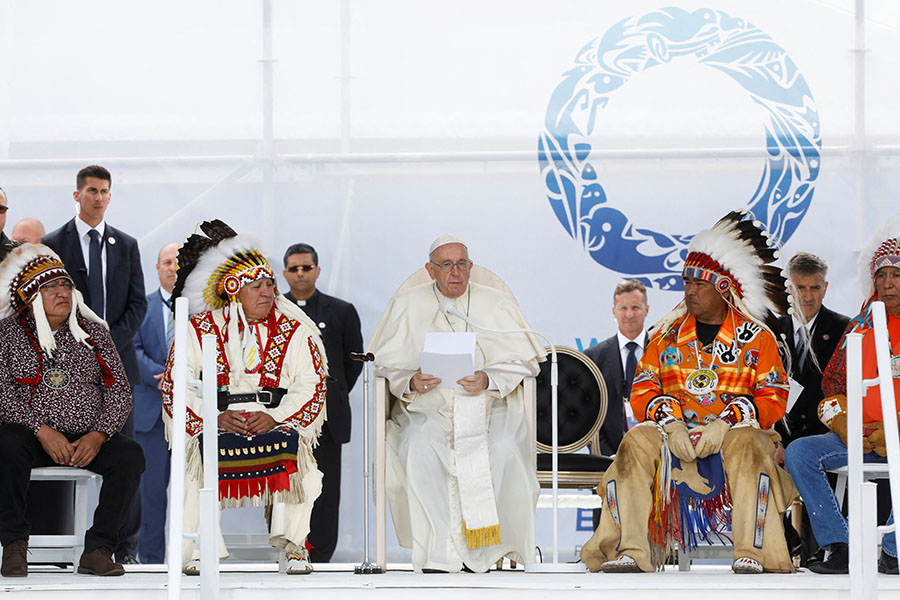
Pope Francis on Monday made good on a promise to apologize to Canada’s native people on their home land for the Church’s role in schools where indigenous children were abused, branding forced cultural assimilation “evil” and a “disastrous error”.
Here are some reactions to Pope’s apology.
Cornell McLean, Acting Grand Chief of the Assembly of Manitoba Chiefs
“It has been over a year since discovering over a thousand unmarked graves of children on Indian Residential School grounds, and we are still mourning them. An apology does not ease the pain of lost children who never returned home, or the legacy First Nations carry as the survivors, their children, and their grandchildren. However, we encourage the church to move forward in the spirit of reconciliation by making concrete commitments and true reparations going forward.”
Wilton Littlechild, an Indigenous Chief, Lawyer and Residential School Survivor
The Pope “listened deeply and with great compassion to the testimonies that told of the way our language was suppressed, our culture taken from us, and our spirituality denigrated.” Littlechild added that he hoped “that our encounter this morning, and the words you share with us, will echo with true healing and real hope throughout many generations to come.”
Ruth Roulette, Residential School Survivor in Manitoba
She said she believed the Pope was sincere and said she needed to hear him say “I’m sorry.” But she felt his speech lacked specificity.
“When he talks about the atrocities that the churches did on our people, he didn’t use the word ‘sexual abuse.’ … That’s what happened. It happened. And why did he not say that?”
Elmer St. Pierre, National Chief, Congress of Aboriginal Peoples
“This a significant first step towards reconciliation and acknowledging the intergenerational trauma residential schools have had on indigenous peoples across Turtle Island. After failed attempts and a lack of will, it’s time the Catholic church make the investments needed to help ensure individuals and communities can heal. It’s time the Catholic church open its record books and help uncover the truths behind residential schools and identify the countless children who never returned home. The symbolic gesture of an apology is appreciated and an important first step, but the Catholic church must now focus on reparations and action to ensure reconciliation can be achieved.
Jason Kenney, Premier of Alberta
“This historic apology by Pope Francis today at Maskwacis builds upon decades of truth and reconciliation efforts. It represents a truly historic moment in confronting the dark history of residential schools and Alberta is honoured to have it take place here.”
“The government policy of residential schools, in which the churches participated, created deep wounds that are not easily or quickly healed. Yet we saw at Maskwacis both the resilience of Indigenous Peoples in preserving their culture, as well as the goodwill of Catholics and other Canadians to both truth and reconciliation.
“Albertans are committed to partnership with Indigenous Peoples for the flourishing of their communities. The presence of Pope Francis in our province invites us to renew that commitment in light of his encouragement to heal the wounds of the past. The Holy Father’s wise words remind us that such healing cannot only be a matter of policies and programs, but must draw upon the deep spiritual resources of Indigenous and Catholic communities in Alberta. I encourage all Albertans to join Indigenous Peoples in those prayers today.”
(Reporting by Canada bureau)
July 25, 2022
Pope Francis Apologizes “For the Evil Committed by So Many Christians Against the Indigenous Peoples” in Canada
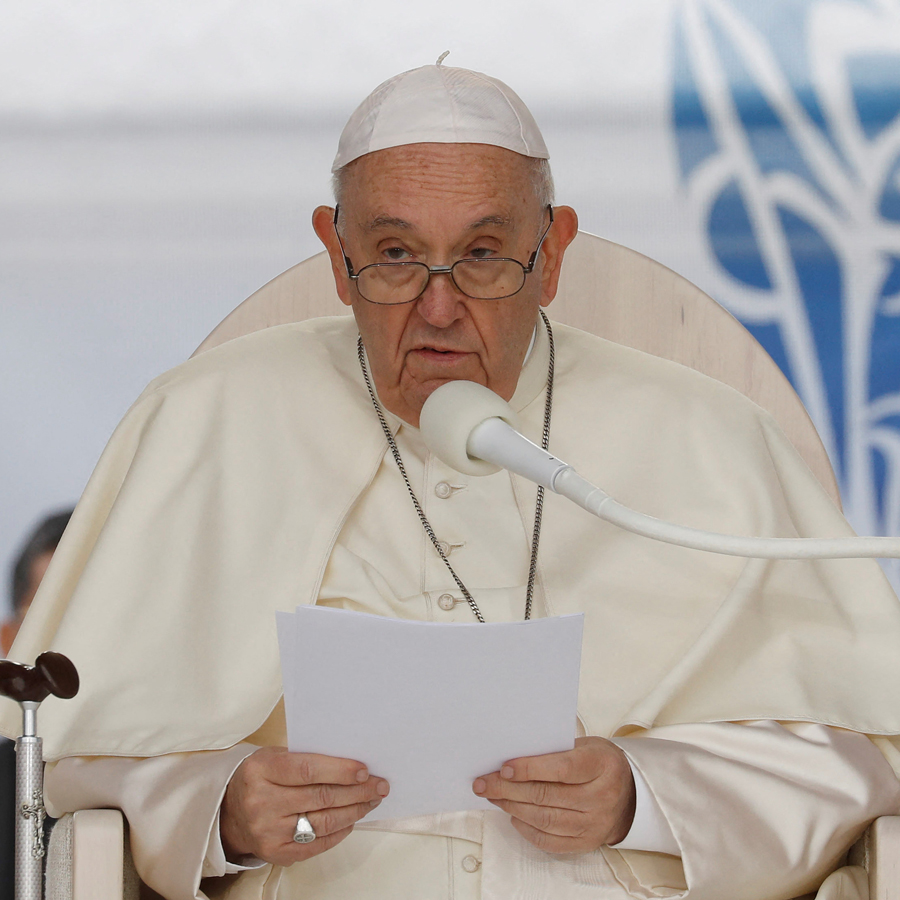
UPDATE: Pope Francis on Monday made good on a promise to apologize to Canada’s Indigenous people on their home land for the Church’s role in schools where Indigenous children were abused, branding forced cultural assimilation “evil” and a “disastrous error.”
Speaking near the site of a former school in Maskwacis, Alberta, Francis apologized for Christian support of the “colonizing mentality” of the times. He called for a “serious investigation” of the so-called residential schools and more assistance to help survivors and descendants heal.
“With shame and unambiguously, I humbly beg forgiveness for the evil committed by so many Christians against the indigenous peoples,” Francis told Indigenous leaders from the First Nations, Metis and Inuit people.
The 85-year-old pope is making the week-long apology tour of Canada to fulfill a promise he made to Indigenous delegations that visited him this year at the Vatican, where he made the initial apology.
“I ask forgiveness, in particular, for the ways in which many members of the Church and of religious communities cooperated, not least through their indifference, in projects of cultural destruction and forced assimilation promoted by the governments of that time, which culminated in the system of residential schools,” he said.
Between 1881 and 1996 more than 150,000 Indigenous children were separated from their families and brought to residential schools. Many children were starved, beaten and sexually abused in a system that Canada’s Truth and Reconciliation Commission called “cultural genocide.”
(Reporting by Philip Pullella and Timon Johnson; editing by Steve Scherer and Deepa Babington)
Pope Francis Arrives in Canada on “Trip of Penance” for Abuse of Indigenous Children at Residential Schools
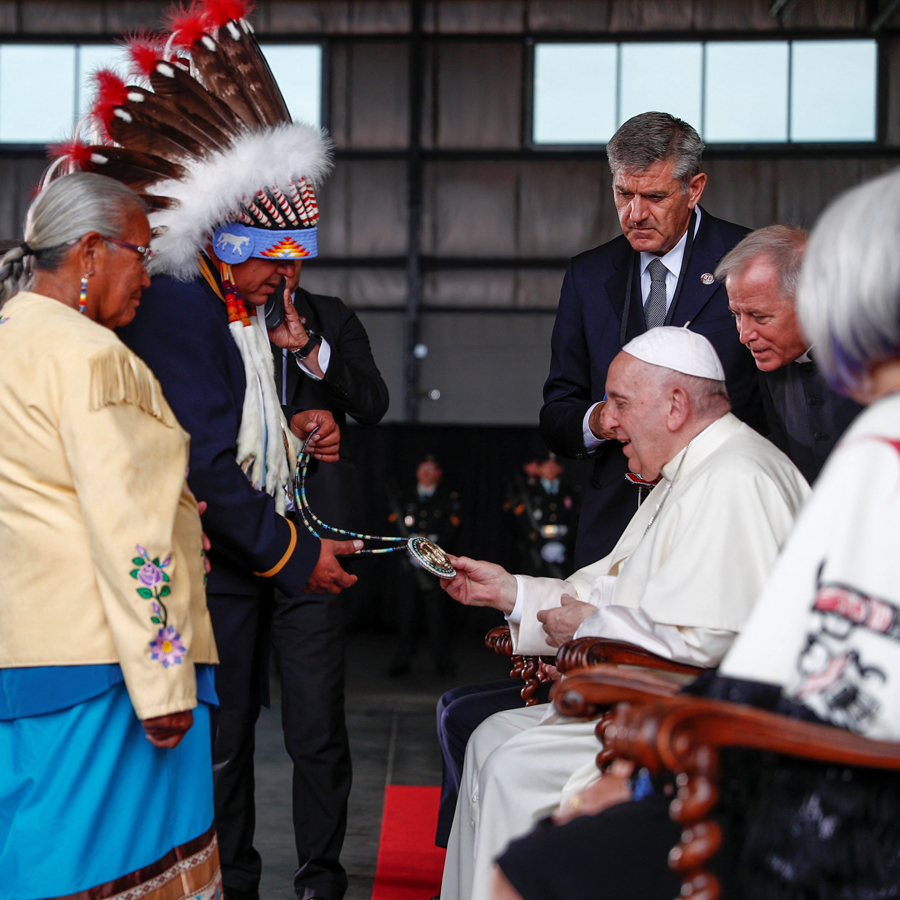
Pope Francis landed in Canada on Sunday to kick off a week-long trip that will centre around his apology on behalf of the Roman Catholic Church for the abuse that Indigenous children endured at mostly church-run residential schools.
“This is a trip of penance. Let’s say that is its spirit,” the pope, 85, told reporters after his flight took off from Rome.
The papal plane touched down in Edmonton in the western province of Alberta, where he will visit a former residential school and meet with Indigenous peoples on Monday. He is also visiting Quebec City and Iqaluit, the capital of the territory of Nunavut. He will depart on Friday.
Between 1881 and 1996 more than 150,000 Indigenous children were separated from their families and brought to residential schools. Many children were starved, beaten and sexually abused in a system that Canada’s Truth and Reconciliation Commission called “cultural genocide.”
The papal plane taxied with Canadian and Vatican flags flapping outside the cockpit windows. After disembarking with the help of a lift, the pope boarded a white Fiat 500X, which dropped him at the hangar. He then proceeded by wheelchair.
Governor General Mary Simon, 74, who represents Canada’s head of state, Queen Elizabeth, was the first to greet the pope. Canadian Prime Minister Justin Trudeau, 50, followed.
The pope sat between the two Canadian officials for a short performance of four drummers and native singing before several Indigenous leaders, many wearing elaborate headdresses, greeted and exchanged gifts with him.
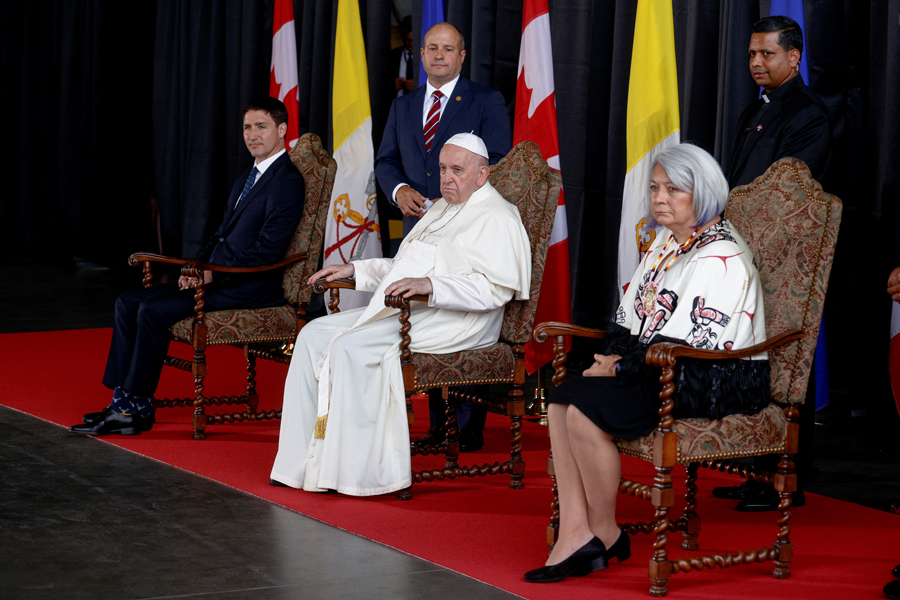
“I asked today the pope to walk with us,” Grand Chief George Arcand of the Confederacy of Treaty Six First Nations said in an interview with the Canadian Broadcasting Corp. “It was a very humbling experience to talk to your holiness.”
RoseAnne Archibald, national chief for the Assembly of First Nations, who also greeted the pope, criticized the “unilateral” organization of the trip and the “archaic” nature of the church, which has no women in leadership positions.
“We don’t feel that it has been about survivors” of residential schools, she told reporters at the airport. “It has been more about the church promoting the church’s idea, fundraising for the church.”
The pope left after the short ceremony in a wheelchair to speak for a few minutes in private with Trudeau and other officials before heading to St. Joseph Seminary, where he is expected to rest before Monday’s events.
The 85-year-old pope canceled a trip to Democratic Republic of Congo and South Sudan in early July because of a knee problem that has recently forced him to use a wheelchair and a cane.
Earlier, aboard the papal plane, the pope said he yearned to visit Ukraine in his efforts to try and bring an end to the five-month-old war that he has repeatedly decried.
“I have a great desire to go to Kyiv,” the pope said when asked about a possible future trip to Ukraine.
In an exclusive interview earlier this month, the pontiff told Reuters that he hoped to be able to go to Moscow and Kyiv soon after his trip to Canada.
Papal Visit and Apology Only a Start
While Canada’s leaders have known about high numbers of children dying at the residential schools since 1907, the issue was thrust to the fore with the discovery of suspected unmarked graves at or near former residential school sites last year.
In response to pressure stemming from those discoveries, the pope apologized for the Catholic church’s role in the schools earlier this year during a visit by Indigenous delegates to the Vatican.
Now he is preparing to apologize on Canadian soil. But survivors and Indigenous leaders have told Reuters they want more.
Many have called for financial compensation, the return of Indigenous artifacts, the release of school records, support for extraditing an accused abuser, and the rescinding of a 15th-century doctrine justifying colonial dispossession of Indigenous people in the form of a papal bull, or edict.
(Reporting by Philip Pullella and Timon Johnson in Edmonton, Anna Mehler Paperny in Toronto; writing by Steve Scherer; editing by Marguerita Choy and Leslie Adler)
RELATED: